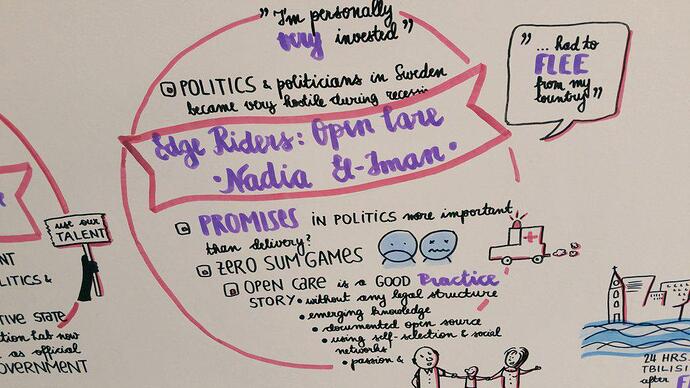Doing public presentations is an inevitable part of building new projects and reaching out to potential clients and partners. It’s also a costly investment of time and we owe it to one another to help improve the returns. This post is the first in a series where I share my own notes and reflections from talks, worshops etc. Hopefully others will do the same so we can learn together…
Yesterday I presented the OpenCare project to an audience for the first time at Politics For Tomorrow, an event organised by @Caroline_Paulick-Thiel. I do a lot of presentations but found this one (slides with speaker noteshere particularly difficult for three reasons:
- it's the first time attempting to weave together and present a new story
- the audience is in a new context for me: Germany + design thinking + politics
- I was also asked to do a workshop with @Susa so it was more difficult to follow up on leads etc.
My talk was an attempt at big-picture thinking and pitching a new project to potential clients, funders and strategic partners. Other presentations were more focused on introducing the organisations, presenting their innovation theory/theory of change and their methodology in compact visualisations.
What where the reactions?
This is what the illustrator doing a graphic recording of the talk got out of it:
These are a few comments and tweets:
“I thought it was really interesting but it was a bit abstract for me” - German, female, works on reforming/ restructuring academic institutions
“Of all the presentations these two days I found yours was the most interesting, but don’t you come up against a lot of resistance from medical professionals?”- British, male, works at the Young Foundation
Very spontanious appearance at #govlabP4T, now listening to @edgeryders - thanks @DanielGoliasch for the tip! #poc21 @openStateBER
“How can tech enable collective intelligence & collaboration? @edgeryders #govlabP4T opensource #socialchange ” - @katrin_thinking
“In Greece there are 68 clinics serving 10% of population without access to health care, ‘illegally’ on donations” @Designamyte
“Would you be interested in doing consultig for a large environmentalist NGO?” - Austrian?, Male, consultant
“Can I have your card, I think I have an idea for you…not this year but next one” - German, 40s, demale, on way out of event
❝You only understand dark matter once you engage w/ the system—and learn about administrative hacks.❞ @Martin_Jordan
Improvements/changes to make ahead of the next presentation:
a) introduction to Edgeryders the vision and history
b) a case study
c) in depth presentation of our unique methodologies and tools and how we practically go about applying them
d) major practical insights

